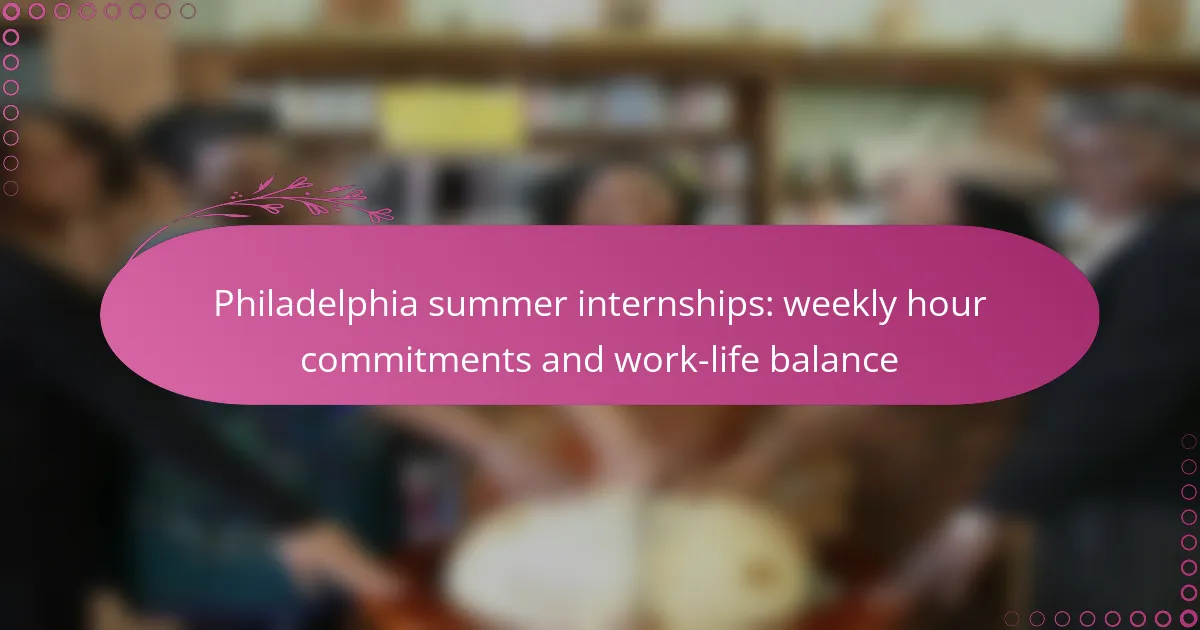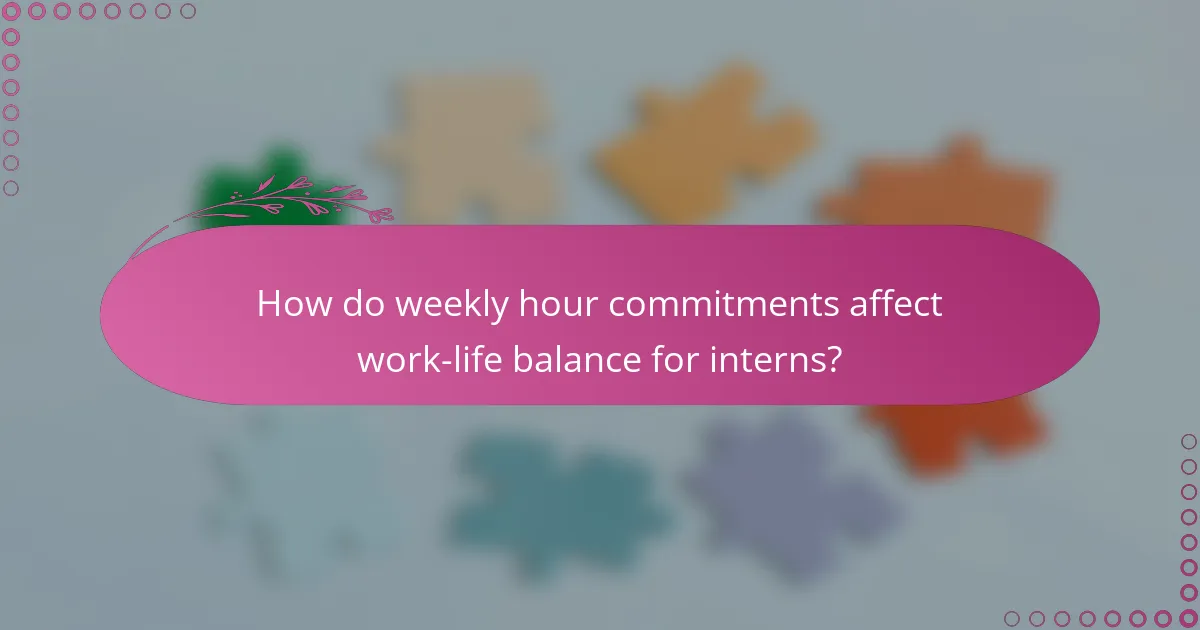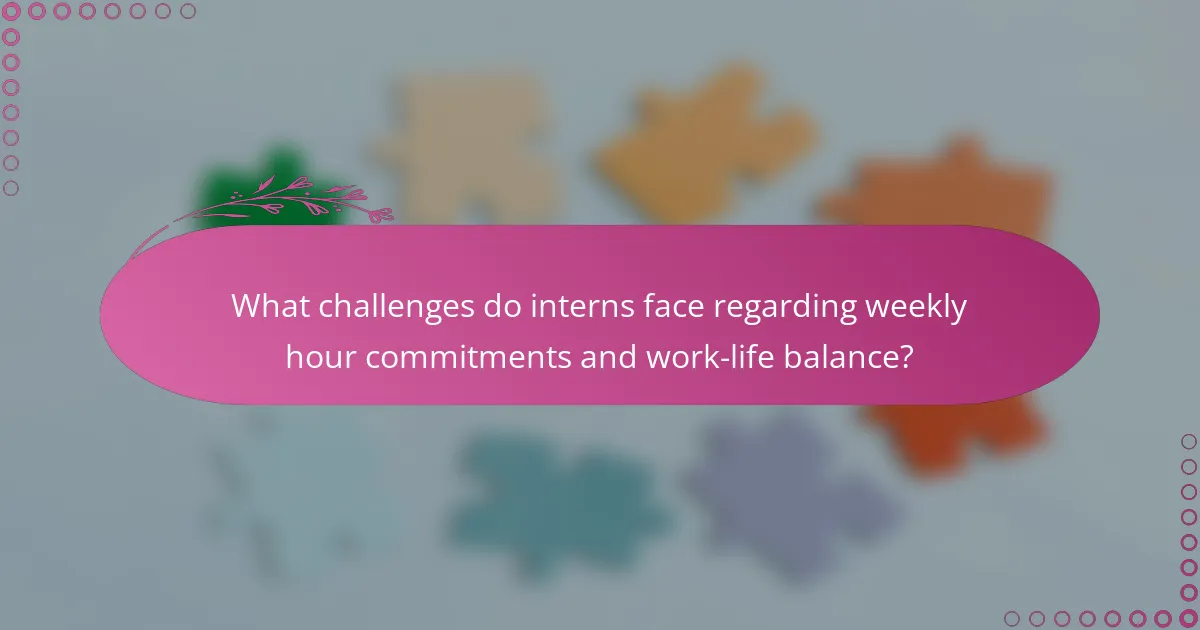

What are Philadelphia summer internships?
Philadelphia summer internships are temporary work placements offered by various organizations in Philadelphia during the summer months. These internships provide students or recent graduates with practical experience in their field of study. They often involve specific projects, mentorship, and opportunities for networking. Interns typically work part-time or full-time, depending on the organization and role. Many internships are unpaid, while some offer stipends or hourly wages. The experience gained can enhance resumes and improve job prospects. According to a survey by the National Association of Colleges and Employers, 60% of internships lead to full-time job offers.
How do Philadelphia summer internships differ from internships in other cities?
Philadelphia summer internships often emphasize a strong work-life balance compared to internships in other cities. Many companies in Philadelphia prioritize flexible work hours. This allows interns to manage personal commitments alongside their professional responsibilities.
Additionally, the average weekly hour commitment for internships in Philadelphia is typically around 20 to 30 hours. This is lower than some major cities where interns may work 40 hours or more.
Philadelphia’s unique cultural environment also influences internship experiences. Interns often engage in networking opportunities that focus on community involvement. This contrasts with cities where internships may be more corporate and less community-oriented.
Overall, Philadelphia internships provide a distinct blend of professional development and personal time, catering to the needs of interns seeking balance.
What unique opportunities do Philadelphia summer internships provide?
Philadelphia summer internships provide unique networking opportunities. Interns can connect with industry professionals in a vibrant city. The internships often offer hands-on experience in diverse fields. Many companies in Philadelphia are known for innovation and leadership. Interns gain insights into local business practices. They also have access to mentorship programs. These experiences enhance both personal and professional growth. Additionally, Philadelphia’s cultural scene enriches the internship experience.
How does the local job market influence Philadelphia summer internships?
The local job market significantly influences Philadelphia summer internships by determining the availability and type of positions offered. A strong job market leads to increased internship opportunities across various industries. In contrast, a weak job market may result in fewer openings and more competition among applicants.
Additionally, local economic conditions affect the compensation levels for internships. Higher demand for interns often correlates with better pay and benefits. Conversely, economic downturns can lead to unpaid or low-paying internships.
Moreover, the local job market shapes the skills and qualifications sought by employers. Interns may need to adapt to meet these demands, enhancing their employability. Overall, the dynamics of the job market directly impact the internship landscape in Philadelphia.
What types of organizations offer summer internships in Philadelphia?
Various types of organizations offer summer internships in Philadelphia. These include non-profit organizations, government agencies, educational institutions, and private companies. Non-profits often focus on community service and social issues. Government agencies provide internships related to public policy and administration. Educational institutions may offer internships in research or administrative roles. Private companies span various industries, including finance, healthcare, and technology, offering diverse opportunities. Each type of organization contributes to the internship landscape in Philadelphia, providing valuable experiences for students and recent graduates.
Which sectors are most prominent for internships in Philadelphia?
The most prominent sectors for internships in Philadelphia include healthcare, technology, finance, and education. Healthcare internships are abundant due to the city’s numerous hospitals and medical institutions. The technology sector is growing rapidly, with many startups and established companies offering internship opportunities. Finance internships are prevalent, particularly in firms located in the city’s financial district. Education-related internships are also significant, as Philadelphia is home to many universities and educational organizations. These sectors consistently provide a range of internship opportunities to students and young professionals.
How do nonprofit internships compare to corporate internships in Philadelphia?
Nonprofit internships in Philadelphia typically offer more flexible hours compared to corporate internships. Nonprofits often prioritize work-life balance, allowing interns to engage in a variety of tasks. Corporate internships, on the other hand, may require more structured hours and a focus on specific projects. Interns at corporations may experience higher expectations for productivity and accountability. According to a survey by the National Association of Colleges and Employers, corporate internships often provide higher stipends than nonprofit positions. However, nonprofit internships may offer unique networking opportunities and hands-on experience in community-focused projects. This can enhance an intern’s resume and skill set in ways that corporate internships might not.
What are the typical weekly hour commitments for Philadelphia summer internships?
Typical weekly hour commitments for Philadelphia summer internships range from 20 to 40 hours. Many internships are designed for full-time engagement, which usually means 35 to 40 hours per week. Part-time internships may require around 20 hours weekly. The specific hours can vary based on the organization and the internship’s nature. Some internships offer flexibility in scheduling, allowing students to balance work and academic responsibilities. According to a survey by NACE, 63% of internships in major cities, including Philadelphia, are full-time during the summer months. This data reflects the common expectation for interns to commit significant hours to gain valuable experience.
How many hours do interns generally work per week in Philadelphia?
Interns in Philadelphia generally work between 15 to 40 hours per week. The specific number of hours often depends on the internship type and the employer’s requirements. Many internships are part-time, typically ranging from 15 to 25 hours weekly. Full-time internships may require 35 to 40 hours per week. According to the National Association of Colleges and Employers, internships in urban areas like Philadelphia often align with standard work hours, reflecting industry demands. This range provides flexibility for interns while balancing other commitments such as classes or part-time jobs.
What factors influence the number of hours required for internships?
The number of hours required for internships is influenced by several factors. The type of internship determines the time commitment. For instance, full-time internships typically require 30 to 40 hours per week. Part-time internships often demand fewer hours, ranging from 10 to 20 weekly. The industry also plays a significant role in hour requirements. Competitive fields may expect longer hours to gain experience. The organization’s policies can dictate the minimum or maximum hours interns must work. Additionally, academic requirements may influence internship hours, as some programs mandate a specific number of hours for credit. Lastly, intern availability and work-life balance preferences can affect how many hours an intern is willing to commit.

How do weekly hour commitments affect work-life balance for interns?
Weekly hour commitments significantly impact the work-life balance for interns. Higher weekly hour commitments can lead to increased stress and reduced personal time. Interns working long hours may struggle to maintain social connections and engage in leisure activities. Research shows that interns working over 20 hours a week report feeling overwhelmed. Conversely, lower hour commitments allow for better time management and personal fulfillment. A balanced workload promotes mental well-being and job satisfaction among interns. Therefore, optimal weekly hour commitments are crucial for maintaining a healthy work-life balance.
What is considered a healthy work-life balance for summer interns?
A healthy work-life balance for summer interns typically involves working 20 to 30 hours per week. This allows interns to gain experience while still having time for personal activities. Interns should also have the flexibility to manage their schedules. This flexibility helps reduce stress and enhances productivity. Studies show that balanced workloads lead to better performance and satisfaction. Maintaining time for social interactions and self-care is essential. A healthy balance prevents burnout and promotes overall well-being.
How do long hours impact interns’ personal lives?
Long hours significantly impact interns’ personal lives by reducing their free time. Interns often struggle to balance work with personal commitments. Studies indicate that excessive work hours can lead to increased stress and burnout. This stress may affect their relationships with family and friends. Interns may also experience a decline in physical health due to lack of time for exercise and self-care. Furthermore, limited personal time can hinder their ability to pursue hobbies or social activities. Research from the American Psychological Association shows that work-life imbalance negatively affects mental health. Therefore, long hours can create a cycle of stress that diminishes overall well-being for interns.
What strategies can interns use to maintain work-life balance?
Interns can maintain work-life balance by setting clear boundaries between work and personal time. They should prioritize tasks to manage workload effectively. Time management techniques, such as the Pomodoro Technique, can enhance focus and productivity. Regular breaks are essential to prevent burnout. Engaging in hobbies or physical activities helps relieve stress. Communication with supervisors about workload expectations is crucial. Utilizing tools like calendars can help interns schedule both work commitments and personal activities. Research shows that maintaining a balanced schedule improves overall well-being and job satisfaction.
How do different industries in Philadelphia approach work-life balance for interns?
Different industries in Philadelphia approach work-life balance for interns with varying degrees of flexibility and support. The technology sector often emphasizes remote work options, allowing interns to manage their schedules effectively. In contrast, the healthcare industry typically requires more structured hours due to patient care demands.
Non-profit organizations frequently promote a culture of work-life balance, offering part-time internships and flexible hours. The finance sector, however, is known for long hours, which can limit interns’ personal time.
Overall, companies in Philadelphia are increasingly recognizing the importance of work-life balance for interns. Many organizations are implementing policies that support mental health and well-being. This trend is evident in the growing number of internships that offer wellness programs and mentorship opportunities.
What are the expectations for work-life balance in corporate internships?
Expectations for work-life balance in corporate internships typically include manageable work hours and flexibility. Interns are often expected to work between 20 to 40 hours per week. Many companies promote a healthy balance by allowing flexible scheduling. This flexibility can help interns manage personal commitments alongside their professional responsibilities. Interns are encouraged to communicate their needs regarding work hours. Companies recognize that a balanced approach can enhance productivity and job satisfaction. Research shows that interns with a good work-life balance report higher levels of engagement and performance.
How do creative industries in Philadelphia support interns’ work-life balance?
Creative industries in Philadelphia support interns’ work-life balance by offering flexible scheduling options. Many organizations allow interns to choose their hours based on personal commitments. This flexibility helps interns manage both work responsibilities and personal life effectively. Additionally, some companies provide remote work opportunities. This arrangement further enhances work-life balance by reducing commute time. Creative industries often promote a culture that values mental health and well-being. They may offer wellness programs or resources to help interns cope with stress. Furthermore, mentorship and guidance are commonly available to assist interns in balancing their workload. Overall, these practices contribute to a supportive environment for interns in Philadelphia.

What challenges do interns face regarding weekly hour commitments and work-life balance?
Interns often face significant challenges with weekly hour commitments and work-life balance. Many internships require long hours that can exceed 40 hours per week. This can lead to fatigue and stress, impacting their overall well-being. Balancing these commitments with academic responsibilities can be difficult. Interns may also struggle to find time for personal activities and self-care. According to a survey by the National Association of Colleges and Employers, 60% of interns reported feeling overwhelmed by their workload. This indicates a prevalent issue among interns in managing their time effectively. The pressure to perform well can further complicate their ability to maintain a healthy work-life balance.
What common issues arise from high weekly hour commitments?
High weekly hour commitments often lead to burnout and stress. Extended work hours can negatively impact mental health. Research shows that working more than 55 hours a week increases the risk of anxiety and depression. Additionally, long hours can disrupt work-life balance. This disruption may result in strained personal relationships. Fatigue from overwork can also reduce productivity and job satisfaction. A study by the World Health Organization found that excessive working hours contribute to health issues. These factors collectively highlight the importance of maintaining reasonable weekly hour commitments.
How can interns manage stress related to demanding schedules?
Interns can manage stress related to demanding schedules by implementing effective time management strategies. Prioritizing tasks helps interns focus on what is most important. Setting specific, achievable goals can reduce feelings of being overwhelmed. Taking regular breaks allows for mental rejuvenation and improved concentration. Engaging in physical activity can alleviate stress and enhance overall well-being. Seeking support from peers or supervisors fosters a collaborative environment. Additionally, practicing mindfulness techniques can help interns stay grounded amidst busy schedules. Research indicates that effective time management can significantly reduce stress levels in high-pressure environments.
What resources are available for interns struggling with work-life balance?
Interns struggling with work-life balance can access various resources. Many universities offer counseling services to help manage stress. Interns can also seek mentorship from program coordinators or supervisors. Online platforms provide workshops on time management and self-care strategies. Employee Assistance Programs (EAP) may be available through internship employers. Networking with fellow interns can offer peer support. Local community centers often host events focused on wellness and balance. Professional organizations may provide resources tailored for interns in specific fields. These resources help interns find a healthier balance between work and personal life.
How can interns negotiate their weekly hour commitments?
Interns can negotiate their weekly hour commitments by clearly communicating their availability. They should assess their personal schedules beforehand. This allows them to propose realistic hours to their employers. Interns should express their commitment to the internship while also highlighting their need for flexibility. It’s important to discuss potential adjustments during the interview or onboarding process. Providing specific examples of their time constraints can help make their case stronger. Research indicates that open communication can lead to better work-life balance for interns. A study by the National Association of Colleges and Employers found that internships with flexible hours improve satisfaction and productivity.
What are effective strategies for discussing hour limits with employers?
Effective strategies for discussing hour limits with employers include preparation, clear communication, and understanding company policies. First, research your company’s policies on work hours. This knowledge allows for informed discussions. Next, prepare your points in advance. Clearly outline your reasons for requesting hour limits. Use specific examples of how limits can enhance productivity. When discussing, communicate your needs assertively but respectfully. Use “I” statements to express your perspective. For instance, say “I believe a limit on hours will help me maintain my performance.” Additionally, be open to compromise. Employers may have constraints that require flexibility. Present potential solutions that meet both your needs and the employer’s expectations. Finally, follow up in writing after the conversation. This reinforces your discussion and provides a record of your agreement.
How can interns advocate for flexible scheduling options?
Interns can advocate for flexible scheduling options by communicating their needs clearly to supervisors. They should prepare a well-structured proposal outlining the benefits of flexible schedules. This proposal can include improved productivity and work-life balance. Interns can also gather support from peers who share similar scheduling needs. Presenting collective feedback can strengthen their case. Additionally, they should be open to compromise and suggest alternative solutions. Providing examples of successful flexible arrangements in similar organizations may help. Lastly, interns should follow up respectfully to keep the conversation ongoing.
What tips can help interns achieve a good work-life balance during their summer internships?
Interns can achieve a good work-life balance during summer internships by setting clear boundaries. Establish specific work hours to avoid overcommitting. Prioritize tasks to manage time effectively. Schedule regular breaks to maintain focus and energy. Engage in extracurricular activities to unwind after work. Communicate openly with supervisors about workload and expectations. Utilize time management tools to stay organized. Lastly, practice self-care to enhance overall well-being.
Philadelphia summer internships are temporary work placements that provide students and recent graduates with practical experience in various fields during the summer months. This article explores the unique attributes of these internships, including their emphasis on work-life balance, typical weekly hour commitments, and the impact of the local job market. It highlights the types of organizations offering internships, prominent sectors, and the differences between nonprofit and corporate internships. Additionally, it addresses challenges interns face regarding hour commitments and offers strategies for maintaining a healthy work-life balance.





